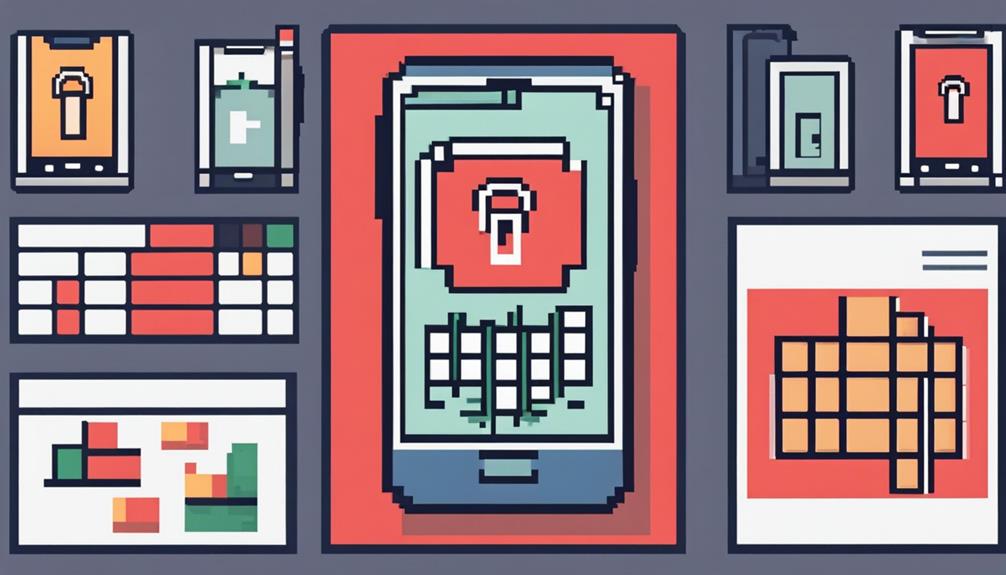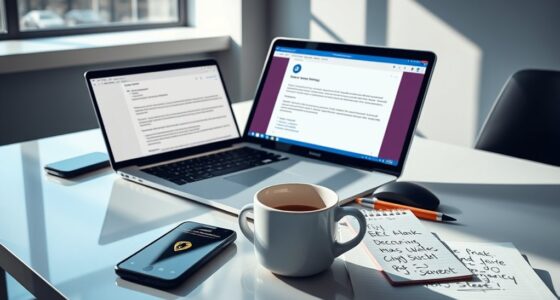To keep your Facebook safe from hackers, use strong passwords with a mix of letters, numbers, and symbols. Enable two-factor authentication for added security. Avoid clicking on suspicious links, especially those asking for personal info. Regularly update passwords and never reuse them. Watch out for phishing scams, checking sender addresses and avoiding urgent requests. Remember to log out on public computers to prevent unauthorized access. These measures help safeguard your account from potentially harmful breaches, ensuring your privacy stays protected.
Key Takeaways
- Use strong passwords with a mix of characters.
- Enable two-factor authentication for added security.
- Avoid clicking on suspicious links or providing personal information.
- Regularly update your password to prevent unauthorized access.
- Be cautious of phishing scams and verify sender information.
Strong Password and 2FA
Utilizing a strong password and implementing two-factor authentication (2FA) are vital steps in safeguarding your Facebook account against potential hackers. When creating a password for your Facebook account, it is important to use a combination of letters, numbers, and symbols to enhance security. Avoid using easily guessable information like birthdays or common words. A strong password acts as the first line of defense against unauthorized access.
Additionally, enabling two-factor authentication (2FA) provides an extra layer of protection. 2FA requires a second form of verification, making it notably harder for hackers to breach your account.
This authentication method offers enhanced security by ensuring that even if your password is compromised, a unique code or token is still needed to access your account.
Avoid Suspicious Links

Enhancing your vigilance against potential threats, particularly in relation to online safety, is important when aiming to safeguard your Facebook account from hackers.
One key aspect to think about is avoiding suspicious links that may lead to phishing attempts. These links often come in messages or emails that appear urgent or contain errors. It is essential to steer clear of clicking on unfamiliar links, especially those that request personal information or prompt you to log in.
Phishing attempts commonly involve fake websites that mimic legitimate platforms like Facebook to deceive users into divulging their login credentials. Before entering any sensitive information, always double-check the URL of the website to confirm its authenticity.
Educating yourself on how to recognize phishing attempts is crucial in protecting your account from malicious hackers. By staying cautious and refraining from interacting with suspicious links, you can greatly reduce the risk of falling victim to online scams and safeguard your personal information on Facebook.
Regular Password Updates

To fortify the security of your Facebook account, it is advisable to regularly update your password. This simple step can greatly enhance the protection of your personal information and prevent unauthorized access.
Here are some key points to keep in mind:
- Changing your password regularly helps maintain the security of your account.
- Regular updates reduce the risk of unauthorized individuals gaining access to your account.
- Setting a reminder to update your password every six months can provide an added layer of security.
- Avoid using the same password for multiple accounts, including your Facebook login.
- Updating your password proactively safeguards your personal information from potential breaches.
Beware of Phishing Scams

Phishing scams pose a significant threat to online security by targeting individuals, businesses, or organizations through deceptive tactics aimed at obtaining sensitive information. These scams often involve fake emails or websites that appear legitimate, tricking users into revealing their login details or other confidential data.
It is essential to be cautious of urgent messages that pressure you to act quickly or provide personal information.
To protect yourself from phishing scams, always check the sender's email address to make sure it is legitimate. Be wary of any suspicious links in emails and verify their authenticity before clicking on them. Remember that legitimate organizations will never ask for sensitive information via email.
Log Out on Public Computers

Always make sure you log out of your Facebook account when utilizing public computers to safeguard your personal information and maintain account security.
- Logging out on public computers reduces the risk of unauthorized access to your account.
- Failure to log out on shared devices can lead to privacy breaches and account compromise.
- Protect your personal information by ensuring you log out of Facebook on public computers.
- Make it a habit to log out of your account on any device that is not your own to maintain security.
- Unauthorized access to your account can occur if you forget to log out on public computers.
Frequently Asked Questions
What Is the First Thing You Do When You Get Hacked on Facebook?
The first step when facing a Facebook account hack is to swiftly address the breach by attempting to regain access and reporting the incident to Facebook promptly. Changing your password, enabling two-factor authentication, and reviewing account activity are essential measures for security.
How Do I Safeguard Myself on Facebook?
To safeguard yourself on Facebook, prioritize cybersecurity measures like using strong, unique passwords, enabling two-factor authentication, adjusting privacy settings, avoiding suspicious links, and being cautious of phishing attempts. Vigilance and proactive security practices are essential.
What Are the 4 Steps We All Must Take to Avoid Getting Hacked?
Implementing strong passwords, enabling two-factor authentication, monitoring account activity, and avoiding phishing scams are essential steps to prevent hacking. Regularly review security settings, stay updated on potential threats, and prioritize safeguarding personal information online.
How Do Hackers Get Into My Facebook Account?
Hackers can infiltrate Facebook accounts through phishing, weak passwords, malicious software, social engineering, and exploiting insecure networks. Vigilance, strong passwords, regular security checks, avoiding suspicious links, and enabling two-factor authentication are vital steps to safeguard your account.
Conclusion
To sum up, protecting your Facebook account from hackers is essential in today's digital age. By implementing strong passwords, enabling two-factor authentication, and staying vigilant against suspicious links and phishing scams, you can safeguard your personal information and privacy online.
Remember to regularly update your password and log out of public computers to further enhance your security. Stay informed and proactive in keeping your Facebook account safe from potential threats.









